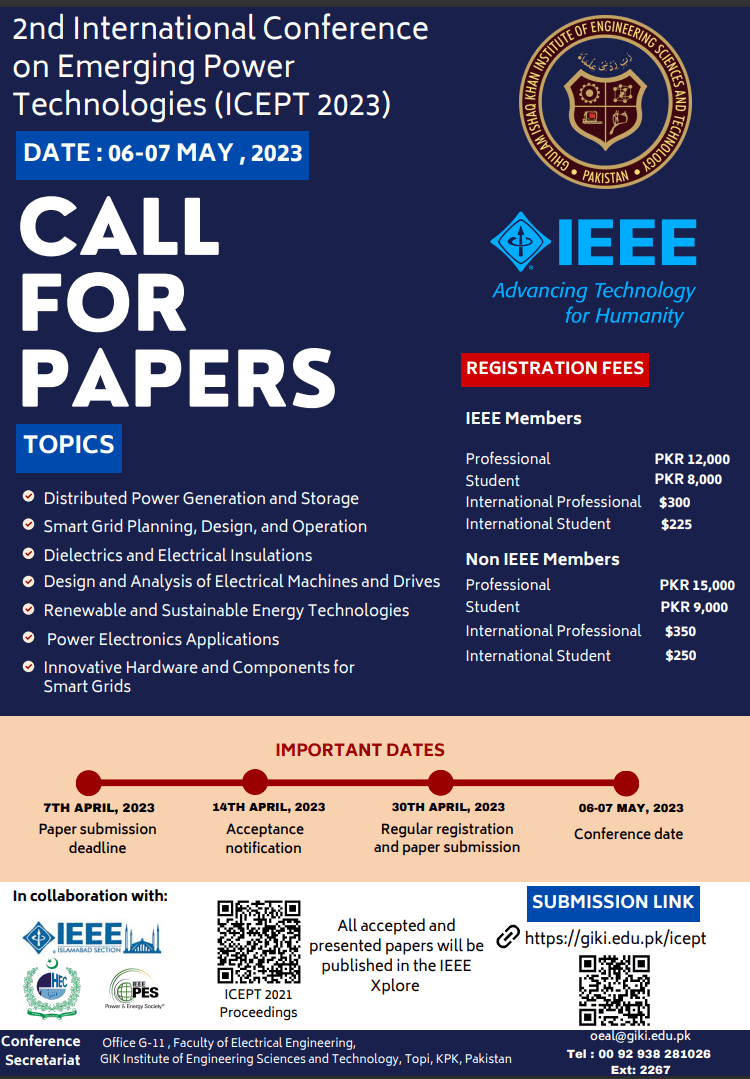

Please click here to visit the conference page for more details
For manual submission of paper (oeal@giki.edu.pk)
http://Conftool.giki.edu.pk:8010
Authors are advised to keep the submissions in line with the following.
Conference Chair | Prof. Dr. Muhammad Akbar |
Organizing Chair | Dr. Hadeed Ahmed Sher |
Technical Program Chair | Prof. Dr. Nisar Ahmed |
General Chair | Dr. Ammar Arshad |
Technical Co-Chair | IEEE Islamabad Section |
Publication Chair | Dr. Hadeed Ahmed Sher |
Treasurer/Finance Chair | Dr. Shahid Alam |
Operations/Local Arrangement Chair | Dr. Attique Ur Rehman |
Workshop Chair | Dr. Arbab Abdur Rahim |
Registration Chair | Mr. Afaq Hussain |
Spread over a vast area of about 421 acres,the Ghulam Ishaq Khan Institute is located in the midst of the unspoilt and nature-richcountry side of the Khyber Pakhtunkhwa Province of Pakistan. Lying at the foot of the beautiful lake of Tarbela Dam, one of the largest earth filled dams of the world, it is set against the picturesque backdrop of rolling hills, vast grassy fields with the mighty Indus meandering across a lush green belt.
Bordering on its campus is the traditional village of Topi, the birthplace of Sahibzada Abdul Qayyum Khan, who was the pioneer of modern education in the province. Close by is the ancient village of Hund where Alexander the Great crossed the Indus. The surrounding area, once known as the land of Gandhara, is dotted profusely with archaeological sites of great cultural significance. These include the well-known sites of the ancient seats of learning, the Taxila University of the Gandhara period, and the Buddhist Monastery at Takht
Bhai. To these seats of learning flocked students and scholars from all over South Asia, Central Asia and China. It is in this region that we find the sayings of Ashoka carved on rocks at Shabaz Garhi; the Naighe Gatte megaliths (stone columns) on the Swabi-Mardan road; and numerous stupas and chambers which fire the imagination of the visitors to the area with the mysteries and glories of its past. The excavated sites around Taxila, at Takht Bhai, Dir andin Swat Valley transport them back to the civilization that flourished here almost 2500 years back. Exquisite relics of that era are the treasured possessions of the museums at Lahore, Peshawar, Karachi, Dir, Swat, and Taxila.
In addition to its great historical character, the location of the Institute offers many advantages. The Gilgit Baltistan Valley which attracts expeditions from all over the world is easily accessible from here. Perhaps the most important advantage is the invaluable opportunities it offers for establishing interaction between industry and the university and close proximity to high-quality industrial minerals. Some of the most important national industries are located quite close to the Institute. These include the Telephone
Industries of Pakistan, Heavy Mechanical Complex, Heavy Electrical Complex, Heavy Industries, Pakistan, Ordnance Factories, Wah Cement Industries, Kamra Aeronautical Complex, Heavy Rebuild Factory, and Pakistan Locomotive Factory. Their proximity offers invaluable opportunities for practical trainingof the students.
Location of the Institute Though away from the congestion, noise, and pollution of big cities, the Institute has easy access to Islamabad and Peshawar. Both cities are connected with the rest of the country through frequent air, train and bus services. Islamabad, the capital of Pakistan, has an international airport which provides ready access to the outside world.
The Institute is located just by the river Indus, adjacent to Tarbela Dam, and near the border with
Punjab. Driving time from Islamabad is just over an hour mostly along the Islamabad – Peshawar
Motorway.